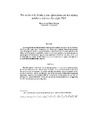Identificador persistente para citar o vincular este elemento:
https://accedacris.ulpgc.es/jspui/handle/10553/59468
| Campo DC | Valor | idioma |
|---|---|---|
| dc.contributor.author | Pérez Ibáñez, María Jesús | en_US |
| dc.contributor.author | Cabrera Abreu, Mercedes | en_US |
| dc.date.accessioned | 2019-12-18T16:59:52Z | - |
| dc.date.available | 2019-12-18T16:59:52Z | - |
| dc.date.issued | 1997 | en_US |
| dc.identifier.issn | 1131-9062 | en_US |
| dc.identifier.other | Dialnet | - |
| dc.identifier.uri | https://accedacris.ulpgc.es/handle/10553/59468 | - |
| dc.description.abstract | La voluntad de los humanistas de retomar los modelos expresivos de la Antigüedad se percibe, entre otros elementos, en el léxico que emplean. Rastreando la tradición del grupo de términos que proponemos, observamos que el conocimiento y asimilación de la tradición científica medieval y el acercamiento a la tradición clásica que propone el humanismo, suponen dos realidades difíciles de conciliar. En el caso concreto que nos ocupa las dificultades que no se resuelven se explican atendiendo a la tradición inmediatamente anterior. | en_US |
| dc.description.abstract | The Humanists’ will to recover the antique patterns of expression can be traced in the lexicon they put in use, among other elements. From investigating the tradition of the set ot terms we propose, we gather that the knowledge and assimilation of the medieval scientific culture and the recovery of the classical tradition that humanism proclaims, constitue two realities difficult to reconcile. In the particular case, we are dealing with, those dificulties which are not solved can be explained by calling back one te immediaíely previous tradition. | en_US |
| dc.language | spa | en_US |
| dc.relation.ispartof | Cuadernos de filología clásica. Estudios latinos | en_US |
| dc.source | Cuadernos de filología clásica: Estudios latinos [ISSN 1131-9062] (13), p. 123-140 | en_US |
| dc.subject | 57 Lingüística | en_US |
| dc.title | En torno a la úvula y sus afecciones en los textos médicos latinos del s: XVI | en_US |
| dc.type | info:eu-repo/semantics/article | en_US |
| dc.type | Article | en_US |
| dc.identifier.url | http://dialnet.unirioja.es/servlet/articulo?codigo=165955 | - |
| dc.description.lastpage | 140 | - |
| dc.identifier.issue | 13 | - |
| dc.description.firstpage | 123 | - |
| dc.investigacion | Artes y Humanidades | en_US |
| dc.type2 | Artículo | en_US |
| dc.contributor.authordialnetid | No ID | - |
| dc.contributor.authordialnetid | 346031 | - |
| dc.identifier.dialnet | 165955ARTREV | - |
| dc.identifier.ulpgc | Sí | es |
| dc.description.sellofecyt | Sello FECYT | |
| dc.description.esci | ESCI | |
| dc.description.erihplus | ERIH PLUS | |
| item.grantfulltext | open | - |
| item.fulltext | Con texto completo | - |
| crisitem.author.dept | GIR Discourse, Communication and Society | - |
| crisitem.author.dept | Departamento de Filología Moderna, Traducción e Interpretación | - |
| crisitem.author.orcid | 0000-0002-7880-1460 | - |
| crisitem.author.parentorg | Departamento de Filología Moderna, Traducción e Interpretación | - |
| crisitem.author.fullName | Cabrera Abreu, Mercedes | - |
| Colección: | Artículos | |
Visitas
272
actualizado el 09-ene-2026
Descargas
248
actualizado el 09-ene-2026
Google ScholarTM
Verifica
Comparte
Exporta metadatos
Los elementos en ULPGC accedaCRIS están protegidos por derechos de autor con todos los derechos reservados, a menos que se indique lo contrario.
